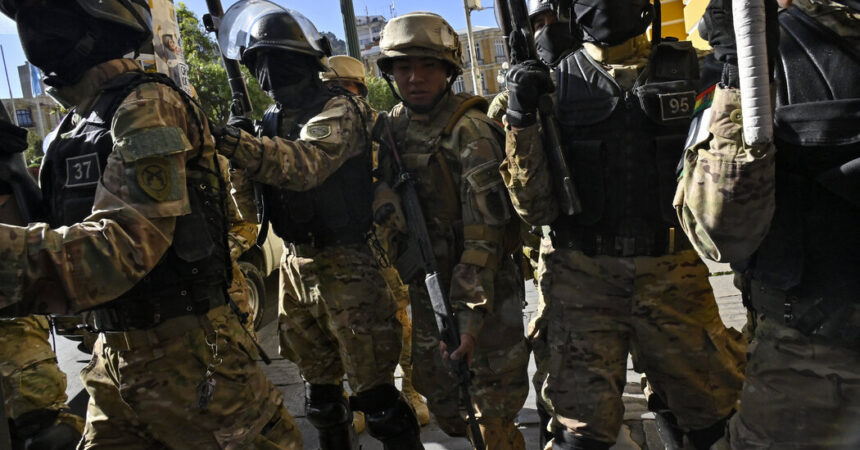After attempting to storm the presidential palace in Bolivia on Wednesday, members of the country’s military, led by a top general, quickly retreated in a failed coup attempt.
Video on Bolivian television showed security forces in riot gear occupying the main square in the administrative capital, La Paz, camouflaged tanks ramming into the palace gates and soldiers trying to make way to the palace.
Then, as quickly as it seemed, the general, Juan José Zuñiga disappeared, and his supporters in the armed forces resigned and were replaced by police officers who supported the democratically elected president, Luis Arce.
Mr. Arce entered the square after calling on Bolivia “to organize and mobilize against the coup and support democracy.”
“Long live the Bolivian people!” shouted at the television address. “Long live democracy!”
In all, try to storm into the palace in the afternoon for only three hours. As the hours wore on, it became clear that General Zuñiga’s plan had no support and he was arrested.
Local news also reported that General Zuñiga was fired from his post this week, which some in the country believe was linked to his remarks about former President Evo Morales, Mr Arce’s mentor.
The coup attempt comes at a tense moment for Bolivia, a landlocked country of 12 million people in South America. Mr. Arce, the leftist and the self-selected successor of Mr. Morales – a very high figure in Bolivian politics who is the country’s first Indigenous president – is now fighting with Mr. Morales for control of the party and who will be the candidate in the 2025 race.
Bolivia’s economy is struggling, and Mr. Arce has been accused of several undemocratic moves, including the arrest of opposition figure Luis Fernando Camacho and former President Jeanine Áñez.
During the attempt to seize the palace, General Zuñiga had entered the building, according to local reporters, before coming out and making a speech surrounded by masked members of the security forces. He criticized Mr. Arce’s government, saying the military was trying to install “real democracy, not just for the few.”
He also asked for the release of several politicians and members of the military who have been imprisoned, including Ms. Áñez and Mr. Camacho.
“Enough rules by a few,” said the general. “Look where that got us! Our children have no future, our people have no future, and the army has no balls to fight for our children tomorrow.
Not long after, Mr. Arce confirmed that he would replace General Zuñiga, the commander-in-chief of the army, as well as the heads of the air force and navy.
In a televised statement, the new commanding general, José Wilson Sánchez Velásquez, asked General Zuñiga “not to shed the blood of our soldiers.”
The public prosecutor’s office announced Wednesday evening that it had opened an investigation against Mr. Zuñiga “and all other participants” of the day’s events, adding that it would seek the “maximum punishment” for those responsible.
The military’s initial move on the palace was immediately criticized by several leaders in the region, including President Luiz Inácio Lula da Silva of Brazil. “The coup has never worked,” he told reporters on Wednesday.
President Andrés Manuel López Obrador of Mexico, who has long expressed his admiration for Mr Arce and Mr Morales, also condemned the coup attempt, calling Mr Arce Bolivia’s “original democratic ruler”.
Under López Obrador’s administration, Mexico first offered asylum to Mr Morales after he resigned in 2019 amid violent protests sparked by disputed elections.
Carlos Saavedra, a Bolivian political analyst, said he was unaware of support in the country for the coup attempt, which he called “the adventure of a small group of soldiers.”
“There is no mobilization in other departments in the country,” he said. “It looks like Zuñiga’s intimate group wants to take command of the army general.”
Emiliano Rodríguez Mega contributed reports from Mexico City.




